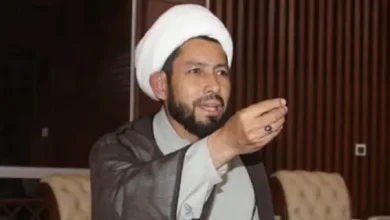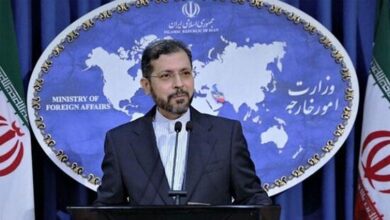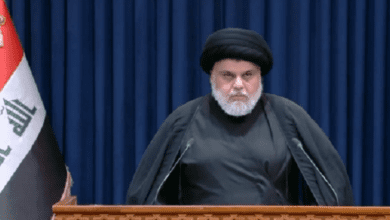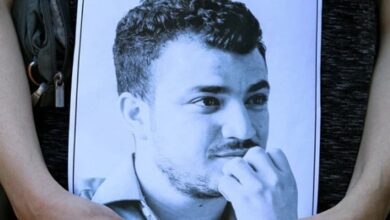On March 3, 2025, Mahdieh Esfandiari, a 39-year-old Iranian academic living in Lyon, a city in east-central France, was arrested by French security officers after a surprise raid at her home.
Her family described it as a case of kidnapping or hostage-taking, saying the officers arrived unannounced, bundled her into a van, and held her without charge or legal counsel for months.
For more than 50 days, she was denied any phone access, kept in solitary confinement, and prevented from contacting her family or friends. This continued until mid-April.
According to Mahdieh’s communication with her family, her interrogation inside French police custody quickly turned into systematic psychological torment. They stripped her of her hijab (Islamic head covering), as her sister also revealed in a recent interview with Press TV.
She had no choice but to use her bedsheet to cover her head each time she offered her daily prayers, and she was also subjected to a full strip search by French male officers.
Despite spending months in solitary confinement without seeing the sky or sunlight, the authorities in France refused to return her hijab, denying her even a few minutes under the sun’s rays
This arrest was neither a criminal matter nor civil rights enforcement. No evidence of wrongdoing was ever produced, and the charges levied against her – vaguely worded “apology of terrorism” – rest on no factual or legal basis and make the case highly suspicious.
The only “crime” she has committed is speaking out for the rights of Palestinians in Gaza, who have been subjected to a modern-day holocaust by the Israeli regime, with the support of France.
Under French law, any detention beyond 48 hours without a judicial warrant is illegal. Yet Esfandiari has now spent 200 days behind bars on vaguely defined accusations of “threatening national security.”
No concrete evidence has ever been produced to substantiate these bogus claims. Her case stands in direct contravention of guarantees enshrined in France’s Code of Criminal Procedure and the European Convention on Human Rights.
After seven months, it has become abundantly clear that the arrest and charges against Esfandiari are baseless and false accusations, and that Paris intends to use her as leverage in a prisoner swap with Iran, exchanging her freedom for French nationals detained in Tehran on espionage charges.
Human-rights defenders warn that France is now arbitrarily arresting Iranian citizens on its soil simply to win diplomatic concessions from Iran’s judiciary – to secure the release of its convicted spies in Iran.
France loudly claims to be a guardian of free speech worldwide. Since the 2015 Charlie Hebdo episode, successive French presidents have doubled down on satirical caricatures, even those insulting Islam’s Prophet, in the name of laïcité (state secularism)
Yet when pro-Palestinians in Paris protest against the pro-Israel policies of the French government, supporting the ongoing genocide in Gaza, by carrying placards, chanting slogans, and staging sit-ins, they are met with tear gas, mass arrests, and years-long criminal probes for “violent extremism.”
France’s interior minister has gone on record saying that pro-Palestine rallies in the country pose a threat to public order.
Quite remarkably, the government in Paris deems cartoons disparaging to Islam a protected form of speech, while political solidarity with Palestinians becomes a public-order crime.
France’s ostensible support for Iranian women’s “rights” reveals another glaring contradiction. During the so-called “Woman, Life, Freedom” riots in 2022 in Iran, French parliamentarians publicly trimmed their hair in “solidarity” with women in Iran, and groups of women staged partially naked performances in the streets to “defend” Iranian women’s dignity.
Yet today, that same government has fabricated charges against an “Iranian” woman who committed no crime and who has been subjected to months of physical, psychological, and emotional torture in a French prison.
Esfandiari’s arrest and incarceration starkly expose blatant double standards and double-speak in France’s approach to freedom of expression and even women’s freedom
It reveals that speech is tolerated only when it aligns with the French government’s political interests. Any amount of criticism of the West or Israel is swiftly and brutally suppressed.
In such an environment, a dissenting Iranian woman can be turned into a bargaining chip in France’s political games. This is not the protection of human rights, but the silencing and destruction of any voice that dares to challenge the propaganda of the Western narrative, all under the guise of the rule of law.
Esfandiari’s case lays bare the blatant violation of human rights and the complete absence of genuine freedom of expression in the West, including in France.
What is called “free speech” is nothing more than a façade, one that has crumbled in the face of cases like that of Esfandiari and many other human-rights activists such as Rima Hassan and Shahin Hezami.
Today, under the banner of freedom of expression, the French government not only fails to defend humanity and the liberty of individuals but, with brazen hypocrisy, condemns defenders of human dignity and critics of the most outrageous genocide in history to the harshest punishments.




